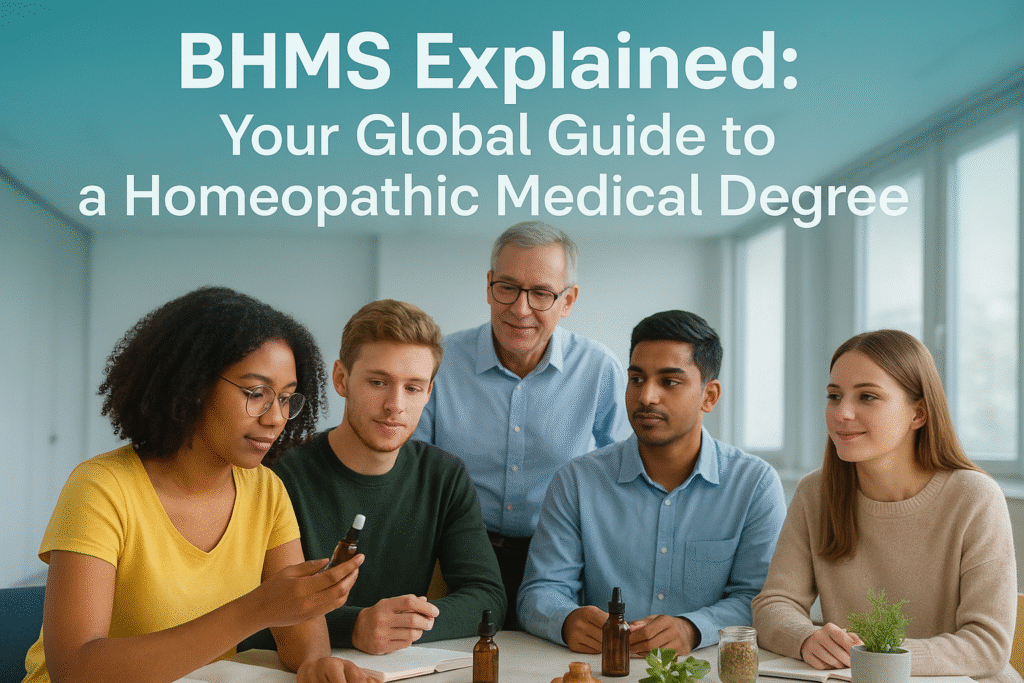The global shift towards integrative and holistic healthcare is creating exciting opportunities for practitioners who blend traditional wisdom with modern medical understanding. At the forefront of this movement is the Bachelor of Homeopathic Medicine and Surgery (BHMS)—a comprehensive professional degree that opens doors to a rewarding career in homeopathic medicine across the globe.
This guide delves into everything you need to know about pursuing a BHMS degree on an international scale, from the curriculum and accreditation to building a successful practice anywhere in the world.

What is a BHMS Degree? The Foundation of Homeopathic Medicine
BHMS stands for Bachelor of Homeopathic Medicine and Surgery. It is an undergraduate, professional degree program that trains students in the principles and practice of homeopathy—a holistic system of medicine based on the principle of “like cures like.”
A BHMS course provides a deep understanding of homeopathic philosophies, materia medica (the study of remedies), and patient care, while also incorporating foundational knowledge of modern anatomy, physiology, and pathology. This blend equips graduates to treat the whole person, not just the disease.
Why Pursue a BHMS Degree? International Advantages
Choosing a BHMS path offers unique benefits in today’s interconnected world:
- Growing Global Demand: The popularity of complementary and alternative medicine (CAM) is rising significantly in North America, Europe, and Australia. This creates a growing international market for qualified homeopathic practitioners.
- Holistic & Patient-Centric Approach: BHMS training focuses on identifying and treating the root cause of illness, aligning with the increasing patient desire for personalized and holistic care.
- Diverse Career Opportunities: A BHMS degree allows you to work in private practice, integrative medical clinics, wellness centers, research, pharmaceutical companies (dealing in homeopathic medicines), and as a consultant, both online and offline for a global clientele.
- Entrepreneurial Potential: The skills gained empower you to start your own practice or wellness brand, offering services and products to a worldwide audience.
- Low Side-Effect Practice: Homeopathy is renowned for its gentle, non-invasive approach with minimal side effects, making it a sought-after modality for chronic conditions and preventative health.
The International BHMS Curriculum: What to Expect
A standard BHMS program typically spans 5.5 years, mirroring the structure of many medical degrees:
- 4.5 Years of Academic Study: This is divided into three phases:
- Pre-Clinical Sciences (1-1.5 years): Foundational modern medical sciences like Anatomy, Physiology, and Biochemistry.
- Para-Clinical Subjects (1-1.5 years): Pathology, Microbiology, Forensic Medicine, and Community Medicine.
- Clinical Homeopathy (2 years): In-depth study of Homeopathic Philosophy, Materia Medica, Repertory, and Case Taking. This is the core of the BHMS degree.
- 1 Year of Compulsory Rotating Internship: Hands-on clinical training in a hospital setting, applying homeopathic and general medical knowledge to treat patients.
Accreditation and Licensing: Practicing Internationally
This is the most critical section for an international audience. Regulations vary greatly by country.
- India: The Central Council of Homoeopathy (CCH) is the statutory body governing homeopathic education and practice. A degree from a CCH-recognized college is mandatory to practice in India.
- United Kingdom: The Society of Homeopaths is a leading professional body. Registration isn’t mandatory by law, but being registered with a professional body is crucial for credibility and insurance.
- United States & Canada: Homeopathy is considered a “drug” regulated by the FDA (US) and Health Canada. Practitioners are often licensed under other healthcare titles (e.g., Naturopathic Doctor – ND, who may use homeopathy). Specific licensing for “Homeopathic Doctor” exists in certain states like Arizona, Connecticut, and Nevada.
- European Union: Regulation varies by member state. Countries like Germany and France have a long history of integrating homeopathy into their healthcare systems, while others have more limited recognition.
- Australia: The Australian Register of Homoeopaths (AROH) is the national self-regulatory body for professional homeopaths.
Key Takeaway: Always research the specific licensing requirements and recognized professional bodies in the country where you intend to practice before enrolling in a program.
Career Paths for BHMS Graduates Worldwide
A BHMS degree opens diverse doors:
- Clinical Practice: Establish a private homeopathic practice.
- Integrative Healthcare Clinics: Work alongside allopathic doctors, naturopaths, and chiropractors in multidisciplinary clinics.
- Research Officer: Conduct clinical trials and research in homeopathic pharmaceuticals.
- Academician: Teach at homeopathic medical colleges.
- Corporate Wellness Consultant: Design wellness programs for companies.
- Online Practitioner & Educator: Offer telehealth consultations and create digital content on holistic health for a global audience.
Conclusion: Is a BHMS Degree Your Path to a Global Career?
Pursuing a BHMS is a commitment to a unique, holistic, and increasingly relevant form of medicine. It offers the potential for a fulfilling career that aligns with the global trend towards integrative health. Success requires not only passion but also diligent research into the legal and professional landscape of your target country.
If you are drawn to a patient-centered, natural approach to healing and are prepared to navigate international regulations, a BHMS degree could be your passport to a rewarding global profession.
